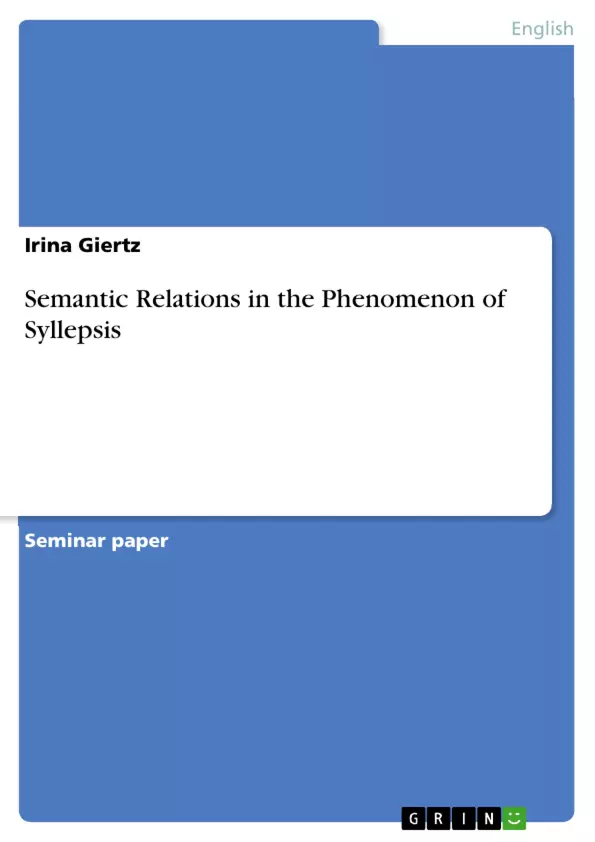This paper aims at investigating the linguistic phenomenon of syllepsis, which is done at three stages. First, the linguistic mechanisms of ambiguity, on which syllepsis is based, are described and their communicative effect is hinted at. Further, zeugma is presented in short as an adjoining figure. Finally, syntactic and semantic varieties of syllepsis are approached with a closer look at the latter. Semantic syllepsis presents the core of this investigation and the word which governs the elliptic parallel construction is elaborated upon. Punning, as the communicative effect of syllepsis, is discussed in great detail. A broader definition of syllepsis following from this exposé is given at the end and is invigorated by a comparison to film montage.
Table of Contents
- Introduction
- Ambiguity
- Linguistic ambiguity
- Poetic ambiguity
- Zeugma
- Syllepsis
- Syntactic syllepsis
- Semantic syllepsis
- Ambiguous word as a bracket
- Vague word as a bracket
- Punning as the communicative effect of syllepsis
Objectives and Key Themes
This investigation aims to explore syllepsis as a linguistic phenomenon, focusing on its ability to generate humor and its role in poetic language. The study examines the relationship between syllepsis and ambiguity, both grammatical and lexical, and analyzes its manifestation as punning.
- The nature and types of ambiguity in language
- The definition and characteristics of syllepsis
- The relationship between syllepsis and punning
- Syllepsis as a tool for creating comedic effect
- The historical perception of syllepsis
Chapter Summaries
Introduction: This introduction sets the stage by defining syllepsis as a linguistic phenomenon capable of generating unexpected humor. It provides examples illustrating syllepsis's use in both casual conversation and literary works, notably Shakespeare's use of puns. The introduction also highlights the contrasting historical views of syllepsis, from its initial perception as a "degenerate kind of wit" to its recognition as a potent linguistic tool.
Ambiguity: This chapter delves into the concept of ambiguity, differentiating between linguistic and poetic ambiguity. It explores linguistic ambiguity in detail, classifying it into grammatical and lexical types. The discussion covers the complexities of homonymy and polysemy, highlighting the challenges of defining and distinguishing between these related concepts. The chapter lays the groundwork for understanding how ambiguity serves as a foundation for syllepsis.
Keywords
Syllepsis, ambiguity, linguistic ambiguity, lexical ambiguity, grammatical ambiguity, homonymy, polysemy, punning, humor, poetic language, Shakespeare,zeugma.
Frequently Asked Questions: A Comprehensive Language Preview
What is the main topic of this language preview?
This preview focuses on syllepsis as a linguistic phenomenon. It explores syllepsis's ability to generate humor, its role in poetic language, and its relationship with ambiguity and punning.
What topics are covered in the preview?
The preview covers a range of topics, including: the nature and types of ambiguity (linguistic and poetic), the definition and characteristics of syllepsis, the relationship between syllepsis and punning, syllepsis as a comedic tool, and historical perspectives on syllepsis. It also includes a detailed table of contents and chapter summaries.
What types of ambiguity are discussed?
The preview differentiates between linguistic and poetic ambiguity. Linguistic ambiguity is further categorized into grammatical and lexical types, with discussions on homonymy and polysemy.
How is syllepsis defined and characterized?
The preview defines syllepsis as a linguistic phenomenon capable of generating unexpected humor. Its characteristics and use in both casual conversation and literary works are explored, with examples from Shakespeare's works highlighting its use in punning.
What is the relationship between syllepsis and punning?
The preview examines the strong connection between syllepsis and punning, demonstrating how syllepsis often manifests as a pun, creating a comedic effect.
What is the historical perspective on syllepsis?
The preview highlights the contrasting historical views of syllepsis, tracing its perception from a "degenerate kind of wit" to its current recognition as a potent linguistic tool.
What are the key chapters and their summaries?
The preview includes summaries of the Introduction and the Ambiguity chapter. The introduction defines syllepsis and provides examples of its use, while the Ambiguity chapter details different types of ambiguity and their relevance to syllepsis.
What are the key words associated with this preview?
Keywords include: Syllepsis, ambiguity, linguistic ambiguity, lexical ambiguity, grammatical ambiguity, homonymy, polysemy, punning, humor, poetic language, Shakespeare, and zeugma.
What is the objective of this language preview?
The main objective is to explore syllepsis as a linguistic phenomenon, focusing on its ability to generate humor and its role in poetic language. It aims to analyze the relationship between syllepsis and ambiguity and its manifestation as punning.
- Arbeit zitieren
- MA Irina Giertz (Autor:in), 2003, Semantic Relations in the Phenomenon of Syllepsis, München, GRIN Verlag, https://www.grin.com/document/27996



